5CHR: Examining HR's Contribution to Organisational Performance
VerifiedAdded on 2023/04/26
|9
|3621
|391
Report
AI Summary
This report discusses HR's contribution to organizational performance, covering business performance evaluation using traditional and modern indicators, and HR's role in business planning and change management. It also explains how different sources of business and contextual data, including HR metrics and industry information, can be assessed and used for planning purposes. The report further reflects on transferring new knowledge and skills gained into working practices, supported by relevant references.
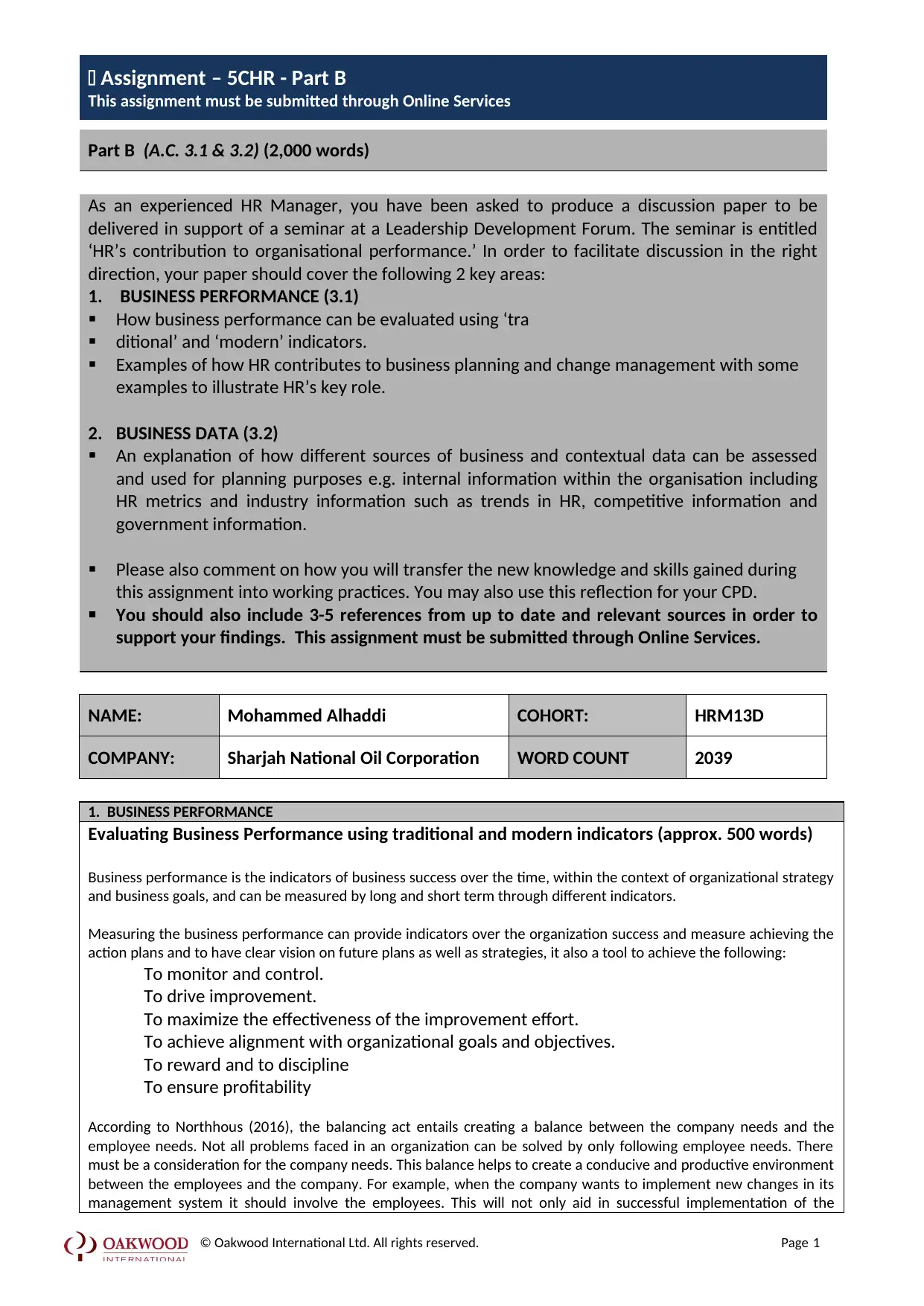
Assignment – 5CHR - Part B
This assignment must be submitted through Online Services
Part B (A.C. 3.1 & 3.2) (2,000 words)
As an experienced HR Manager, you have been asked to produce a discussion paper to be
delivered in support of a seminar at a Leadership Development Forum. The seminar is entitled
‘HR’s contribution to organisational performance.’ In order to facilitate discussion in the right
direction, your paper should cover the following 2 key areas:
1. BUSINESS PERFORMANCE (3.1)
How business performance can be evaluated using ‘tra
ditional’ and ‘modern’ indicators.
Examples of how HR contributes to business planning and change management with some
examples to illustrate HR’s key role.
2. BUSINESS DATA (3.2)
An explanation of how different sources of business and contextual data can be assessed
and used for planning purposes e.g. internal information within the organisation including
HR metrics and industry information such as trends in HR, competitive information and
government information.
Please also comment on how you will transfer the new knowledge and skills gained during
this assignment into working practices. You may also use this reflection for your CPD.
You should also include 3-5 references from up to date and relevant sources in order to
support your findings. This assignment must be submitted through Online Services.
NAME: Mohammed Alhaddi COHORT: HRM13D
COMPANY: Sharjah National Oil Corporation WORD COUNT 2039
1. BUSINESS PERFORMANCE
Evaluating Business Performance using traditional and modern indicators (approx. 500 words)
Business performance is the indicators of business success over the time, within the context of organizational strategy
and business goals, and can be measured by long and short term through different indicators.
Measuring the business performance can provide indicators over the organization success and measure achieving the
action plans and to have clear vision on future plans as well as strategies, it also a tool to achieve the following:
To monitor and control.
To drive improvement.
To maximize the effectiveness of the improvement effort.
To achieve alignment with organizational goals and objectives.
To reward and to discipline
To ensure profitability
According to Northhous (2016), the balancing act entails creating a balance between the company needs and the
employee needs. Not all problems faced in an organization can be solved by only following employee needs. There
must be a consideration for the company needs. This balance helps to create a conducive and productive environment
between the employees and the company. For example, when the company wants to implement new changes in its
management system it should involve the employees. This will not only aid in successful implementation of the
© Oakwood International Ltd. All rights reserved. Page 1
This assignment must be submitted through Online Services
Part B (A.C. 3.1 & 3.2) (2,000 words)
As an experienced HR Manager, you have been asked to produce a discussion paper to be
delivered in support of a seminar at a Leadership Development Forum. The seminar is entitled
‘HR’s contribution to organisational performance.’ In order to facilitate discussion in the right
direction, your paper should cover the following 2 key areas:
1. BUSINESS PERFORMANCE (3.1)
How business performance can be evaluated using ‘tra
ditional’ and ‘modern’ indicators.
Examples of how HR contributes to business planning and change management with some
examples to illustrate HR’s key role.
2. BUSINESS DATA (3.2)
An explanation of how different sources of business and contextual data can be assessed
and used for planning purposes e.g. internal information within the organisation including
HR metrics and industry information such as trends in HR, competitive information and
government information.
Please also comment on how you will transfer the new knowledge and skills gained during
this assignment into working practices. You may also use this reflection for your CPD.
You should also include 3-5 references from up to date and relevant sources in order to
support your findings. This assignment must be submitted through Online Services.
NAME: Mohammed Alhaddi COHORT: HRM13D
COMPANY: Sharjah National Oil Corporation WORD COUNT 2039
1. BUSINESS PERFORMANCE
Evaluating Business Performance using traditional and modern indicators (approx. 500 words)
Business performance is the indicators of business success over the time, within the context of organizational strategy
and business goals, and can be measured by long and short term through different indicators.
Measuring the business performance can provide indicators over the organization success and measure achieving the
action plans and to have clear vision on future plans as well as strategies, it also a tool to achieve the following:
To monitor and control.
To drive improvement.
To maximize the effectiveness of the improvement effort.
To achieve alignment with organizational goals and objectives.
To reward and to discipline
To ensure profitability
According to Northhous (2016), the balancing act entails creating a balance between the company needs and the
employee needs. Not all problems faced in an organization can be solved by only following employee needs. There
must be a consideration for the company needs. This balance helps to create a conducive and productive environment
between the employees and the company. For example, when the company wants to implement new changes in its
management system it should involve the employees. This will not only aid in successful implementation of the
© Oakwood International Ltd. All rights reserved. Page 1
Paraphrase This Document
Need a fresh take? Get an instant paraphrase of this document with our AI Paraphraser
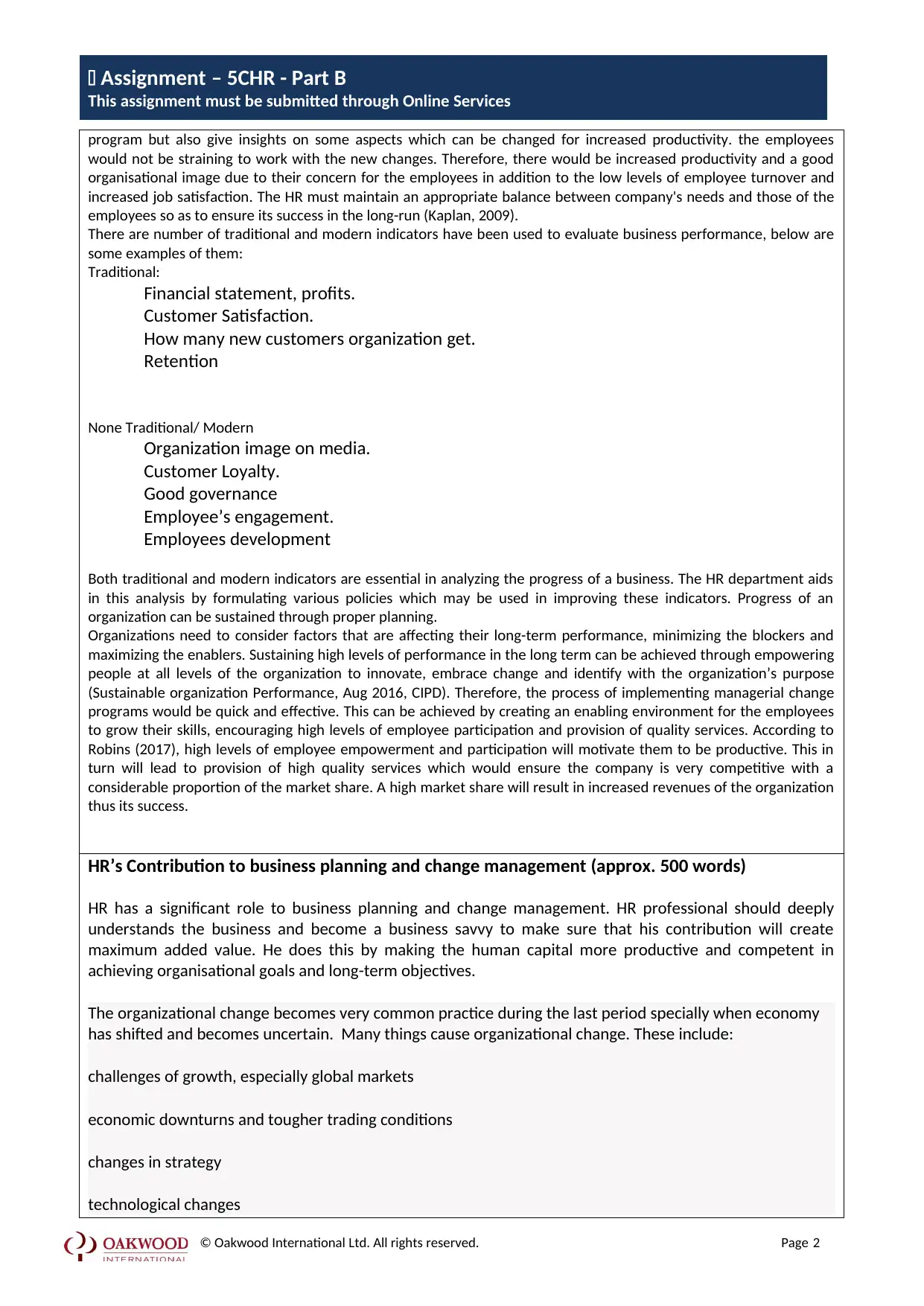
Assignment – 5CHR - Part B
This assignment must be submitted through Online Services
program but also give insights on some aspects which can be changed for increased productivity. the employees
would not be straining to work with the new changes. Therefore, there would be increased productivity and a good
organisational image due to their concern for the employees in addition to the low levels of employee turnover and
increased job satisfaction. The HR must maintain an appropriate balance between company's needs and those of the
employees so as to ensure its success in the long-run (Kaplan, 2009).
There are number of traditional and modern indicators have been used to evaluate business performance, below are
some examples of them:
Traditional:
Financial statement, profits.
Customer Satisfaction.
How many new customers organization get.
Retention
None Traditional/ Modern
Organization image on media.
Customer Loyalty.
Good governance
Employee’s engagement.
Employees development
Both traditional and modern indicators are essential in analyzing the progress of a business. The HR department aids
in this analysis by formulating various policies which may be used in improving these indicators. Progress of an
organization can be sustained through proper planning.
Organizations need to consider factors that are affecting their long-term performance, minimizing the blockers and
maximizing the enablers. Sustaining high levels of performance in the long term can be achieved through empowering
people at all levels of the organization to innovate, embrace change and identify with the organization’s purpose
(Sustainable organization Performance, Aug 2016, CIPD). Therefore, the process of implementing managerial change
programs would be quick and effective. This can be achieved by creating an enabling environment for the employees
to grow their skills, encouraging high levels of employee participation and provision of quality services. According to
Robins (2017), high levels of employee empowerment and participation will motivate them to be productive. This in
turn will lead to provision of high quality services which would ensure the company is very competitive with a
considerable proportion of the market share. A high market share will result in increased revenues of the organization
thus its success.
HR’s Contribution to business planning and change management (approx. 500 words)
HR has a significant role to business planning and change management. HR professional should deeply
understands the business and become a business savvy to make sure that his contribution will create
maximum added value. He does this by making the human capital more productive and competent in
achieving organisational goals and long-term objectives.
The organizational change becomes very common practice during the last period specially when economy
has shifted and becomes uncertain. Many things cause organizational change. These include:
challenges of growth, especially global markets
economic downturns and tougher trading conditions
changes in strategy
technological changes
© Oakwood International Ltd. All rights reserved. Page 2
This assignment must be submitted through Online Services
program but also give insights on some aspects which can be changed for increased productivity. the employees
would not be straining to work with the new changes. Therefore, there would be increased productivity and a good
organisational image due to their concern for the employees in addition to the low levels of employee turnover and
increased job satisfaction. The HR must maintain an appropriate balance between company's needs and those of the
employees so as to ensure its success in the long-run (Kaplan, 2009).
There are number of traditional and modern indicators have been used to evaluate business performance, below are
some examples of them:
Traditional:
Financial statement, profits.
Customer Satisfaction.
How many new customers organization get.
Retention
None Traditional/ Modern
Organization image on media.
Customer Loyalty.
Good governance
Employee’s engagement.
Employees development
Both traditional and modern indicators are essential in analyzing the progress of a business. The HR department aids
in this analysis by formulating various policies which may be used in improving these indicators. Progress of an
organization can be sustained through proper planning.
Organizations need to consider factors that are affecting their long-term performance, minimizing the blockers and
maximizing the enablers. Sustaining high levels of performance in the long term can be achieved through empowering
people at all levels of the organization to innovate, embrace change and identify with the organization’s purpose
(Sustainable organization Performance, Aug 2016, CIPD). Therefore, the process of implementing managerial change
programs would be quick and effective. This can be achieved by creating an enabling environment for the employees
to grow their skills, encouraging high levels of employee participation and provision of quality services. According to
Robins (2017), high levels of employee empowerment and participation will motivate them to be productive. This in
turn will lead to provision of high quality services which would ensure the company is very competitive with a
considerable proportion of the market share. A high market share will result in increased revenues of the organization
thus its success.
HR’s Contribution to business planning and change management (approx. 500 words)
HR has a significant role to business planning and change management. HR professional should deeply
understands the business and become a business savvy to make sure that his contribution will create
maximum added value. He does this by making the human capital more productive and competent in
achieving organisational goals and long-term objectives.
The organizational change becomes very common practice during the last period specially when economy
has shifted and becomes uncertain. Many things cause organizational change. These include:
challenges of growth, especially global markets
economic downturns and tougher trading conditions
changes in strategy
technological changes
© Oakwood International Ltd. All rights reserved. Page 2
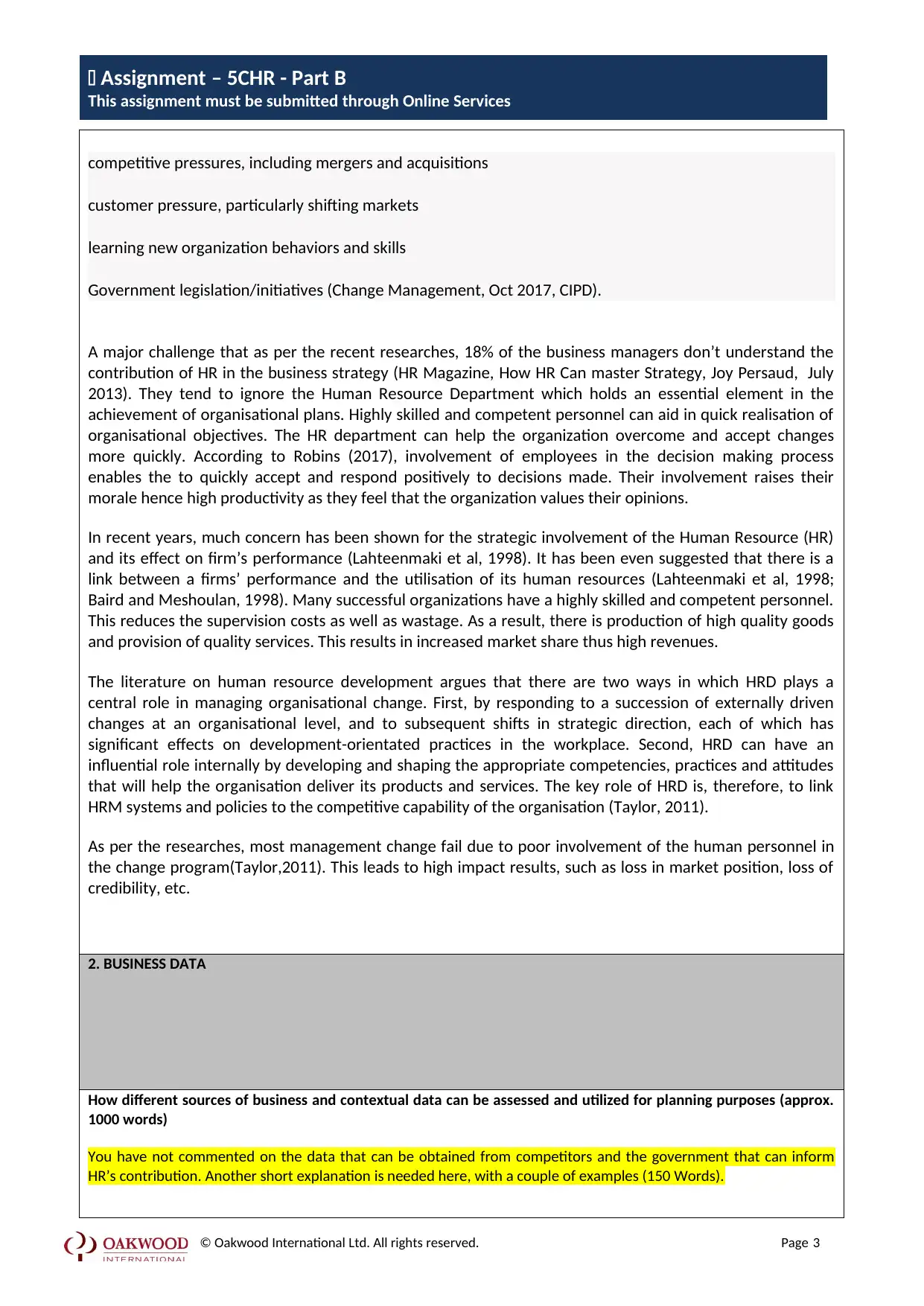
Assignment – 5CHR - Part B
This assignment must be submitted through Online Services
competitive pressures, including mergers and acquisitions
customer pressure, particularly shifting markets
learning new organization behaviors and skills
Government legislation/initiatives (Change Management, Oct 2017, CIPD).
A major challenge that as per the recent researches, 18% of the business managers don’t understand the
contribution of HR in the business strategy (HR Magazine, How HR Can master Strategy, Joy Persaud, July
2013). They tend to ignore the Human Resource Department which holds an essential element in the
achievement of organisational plans. Highly skilled and competent personnel can aid in quick realisation of
organisational objectives. The HR department can help the organization overcome and accept changes
more quickly. According to Robins (2017), involvement of employees in the decision making process
enables the to quickly accept and respond positively to decisions made. Their involvement raises their
morale hence high productivity as they feel that the organization values their opinions.
In recent years, much concern has been shown for the strategic involvement of the Human Resource (HR)
and its effect on firm’s performance (Lahteenmaki et al, 1998). It has been even suggested that there is a
link between a firms’ performance and the utilisation of its human resources (Lahteenmaki et al, 1998;
Baird and Meshoulan, 1998). Many successful organizations have a highly skilled and competent personnel.
This reduces the supervision costs as well as wastage. As a result, there is production of high quality goods
and provision of quality services. This results in increased market share thus high revenues.
The literature on human resource development argues that there are two ways in which HRD plays a
central role in managing organisational change. First, by responding to a succession of externally driven
changes at an organisational level, and to subsequent shifts in strategic direction, each of which has
significant effects on development-orientated practices in the workplace. Second, HRD can have an
influential role internally by developing and shaping the appropriate competencies, practices and attitudes
that will help the organisation deliver its products and services. The key role of HRD is, therefore, to link
HRM systems and policies to the competitive capability of the organisation (Taylor, 2011).
As per the researches, most management change fail due to poor involvement of the human personnel in
the change program(Taylor,2011). This leads to high impact results, such as loss in market position, loss of
credibility, etc.
2. BUSINESS DATA
How different sources of business and contextual data can be assessed and utilized for planning purposes (approx.
1000 words)
You have not commented on the data that can be obtained from competitors and the government that can inform
HR’s contribution. Another short explanation is needed here, with a couple of examples (150 Words).
© Oakwood International Ltd. All rights reserved. Page 3
This assignment must be submitted through Online Services
competitive pressures, including mergers and acquisitions
customer pressure, particularly shifting markets
learning new organization behaviors and skills
Government legislation/initiatives (Change Management, Oct 2017, CIPD).
A major challenge that as per the recent researches, 18% of the business managers don’t understand the
contribution of HR in the business strategy (HR Magazine, How HR Can master Strategy, Joy Persaud, July
2013). They tend to ignore the Human Resource Department which holds an essential element in the
achievement of organisational plans. Highly skilled and competent personnel can aid in quick realisation of
organisational objectives. The HR department can help the organization overcome and accept changes
more quickly. According to Robins (2017), involvement of employees in the decision making process
enables the to quickly accept and respond positively to decisions made. Their involvement raises their
morale hence high productivity as they feel that the organization values their opinions.
In recent years, much concern has been shown for the strategic involvement of the Human Resource (HR)
and its effect on firm’s performance (Lahteenmaki et al, 1998). It has been even suggested that there is a
link between a firms’ performance and the utilisation of its human resources (Lahteenmaki et al, 1998;
Baird and Meshoulan, 1998). Many successful organizations have a highly skilled and competent personnel.
This reduces the supervision costs as well as wastage. As a result, there is production of high quality goods
and provision of quality services. This results in increased market share thus high revenues.
The literature on human resource development argues that there are two ways in which HRD plays a
central role in managing organisational change. First, by responding to a succession of externally driven
changes at an organisational level, and to subsequent shifts in strategic direction, each of which has
significant effects on development-orientated practices in the workplace. Second, HRD can have an
influential role internally by developing and shaping the appropriate competencies, practices and attitudes
that will help the organisation deliver its products and services. The key role of HRD is, therefore, to link
HRM systems and policies to the competitive capability of the organisation (Taylor, 2011).
As per the researches, most management change fail due to poor involvement of the human personnel in
the change program(Taylor,2011). This leads to high impact results, such as loss in market position, loss of
credibility, etc.
2. BUSINESS DATA
How different sources of business and contextual data can be assessed and utilized for planning purposes (approx.
1000 words)
You have not commented on the data that can be obtained from competitors and the government that can inform
HR’s contribution. Another short explanation is needed here, with a couple of examples (150 Words).
© Oakwood International Ltd. All rights reserved. Page 3
⊘ This is a preview!⊘
Do you want full access?
Subscribe today to unlock all pages.

Trusted by 1+ million students worldwide
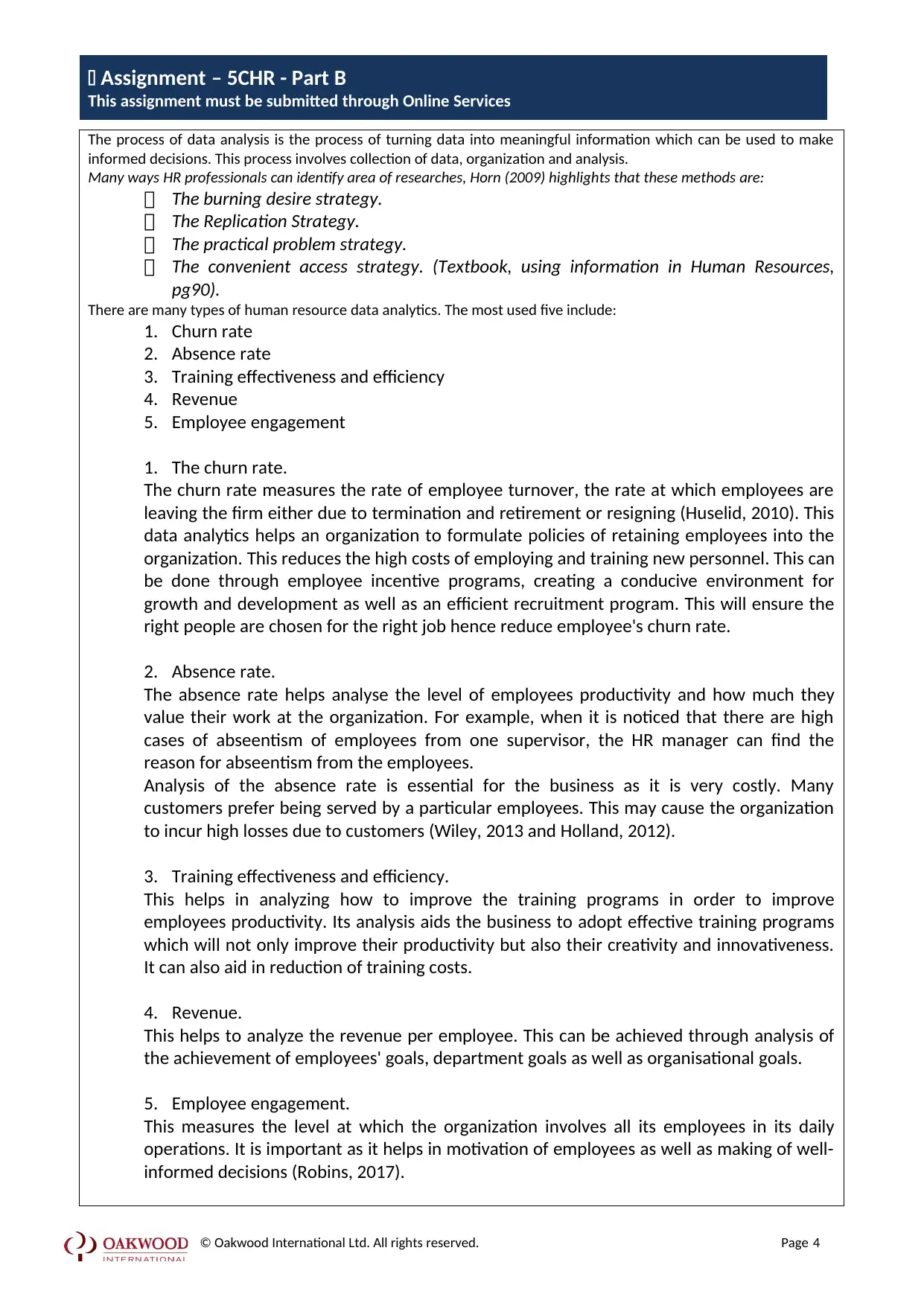
Assignment – 5CHR - Part B
This assignment must be submitted through Online Services
The process of data analysis is the process of turning data into meaningful information which can be used to make
informed decisions. This process involves collection of data, organization and analysis.
Many ways HR professionals can identify area of researches, Horn (2009) highlights that these methods are:
The burning desire strategy.
The Replication Strategy.
The practical problem strategy.
The convenient access strategy. (Textbook, using information in Human Resources,
pg90).
There are many types of human resource data analytics. The most used five include:
1. Churn rate
2. Absence rate
3. Training effectiveness and efficiency
4. Revenue
5. Employee engagement
1. The churn rate.
The churn rate measures the rate of employee turnover, the rate at which employees are
leaving the firm either due to termination and retirement or resigning (Huselid, 2010). This
data analytics helps an organization to formulate policies of retaining employees into the
organization. This reduces the high costs of employing and training new personnel. This can
be done through employee incentive programs, creating a conducive environment for
growth and development as well as an efficient recruitment program. This will ensure the
right people are chosen for the right job hence reduce employee's churn rate.
2. Absence rate.
The absence rate helps analyse the level of employees productivity and how much they
value their work at the organization. For example, when it is noticed that there are high
cases of abseentism of employees from one supervisor, the HR manager can find the
reason for abseentism from the employees.
Analysis of the absence rate is essential for the business as it is very costly. Many
customers prefer being served by a particular employees. This may cause the organization
to incur high losses due to customers (Wiley, 2013 and Holland, 2012).
3. Training effectiveness and efficiency.
This helps in analyzing how to improve the training programs in order to improve
employees productivity. Its analysis aids the business to adopt effective training programs
which will not only improve their productivity but also their creativity and innovativeness.
It can also aid in reduction of training costs.
4. Revenue.
This helps to analyze the revenue per employee. This can be achieved through analysis of
the achievement of employees' goals, department goals as well as organisational goals.
5. Employee engagement.
This measures the level at which the organization involves all its employees in its daily
operations. It is important as it helps in motivation of employees as well as making of well-
informed decisions (Robins, 2017).
© Oakwood International Ltd. All rights reserved. Page 4
This assignment must be submitted through Online Services
The process of data analysis is the process of turning data into meaningful information which can be used to make
informed decisions. This process involves collection of data, organization and analysis.
Many ways HR professionals can identify area of researches, Horn (2009) highlights that these methods are:
The burning desire strategy.
The Replication Strategy.
The practical problem strategy.
The convenient access strategy. (Textbook, using information in Human Resources,
pg90).
There are many types of human resource data analytics. The most used five include:
1. Churn rate
2. Absence rate
3. Training effectiveness and efficiency
4. Revenue
5. Employee engagement
1. The churn rate.
The churn rate measures the rate of employee turnover, the rate at which employees are
leaving the firm either due to termination and retirement or resigning (Huselid, 2010). This
data analytics helps an organization to formulate policies of retaining employees into the
organization. This reduces the high costs of employing and training new personnel. This can
be done through employee incentive programs, creating a conducive environment for
growth and development as well as an efficient recruitment program. This will ensure the
right people are chosen for the right job hence reduce employee's churn rate.
2. Absence rate.
The absence rate helps analyse the level of employees productivity and how much they
value their work at the organization. For example, when it is noticed that there are high
cases of abseentism of employees from one supervisor, the HR manager can find the
reason for abseentism from the employees.
Analysis of the absence rate is essential for the business as it is very costly. Many
customers prefer being served by a particular employees. This may cause the organization
to incur high losses due to customers (Wiley, 2013 and Holland, 2012).
3. Training effectiveness and efficiency.
This helps in analyzing how to improve the training programs in order to improve
employees productivity. Its analysis aids the business to adopt effective training programs
which will not only improve their productivity but also their creativity and innovativeness.
It can also aid in reduction of training costs.
4. Revenue.
This helps to analyze the revenue per employee. This can be achieved through analysis of
the achievement of employees' goals, department goals as well as organisational goals.
5. Employee engagement.
This measures the level at which the organization involves all its employees in its daily
operations. It is important as it helps in motivation of employees as well as making of well-
informed decisions (Robins, 2017).
© Oakwood International Ltd. All rights reserved. Page 4
Paraphrase This Document
Need a fresh take? Get an instant paraphrase of this document with our AI Paraphraser
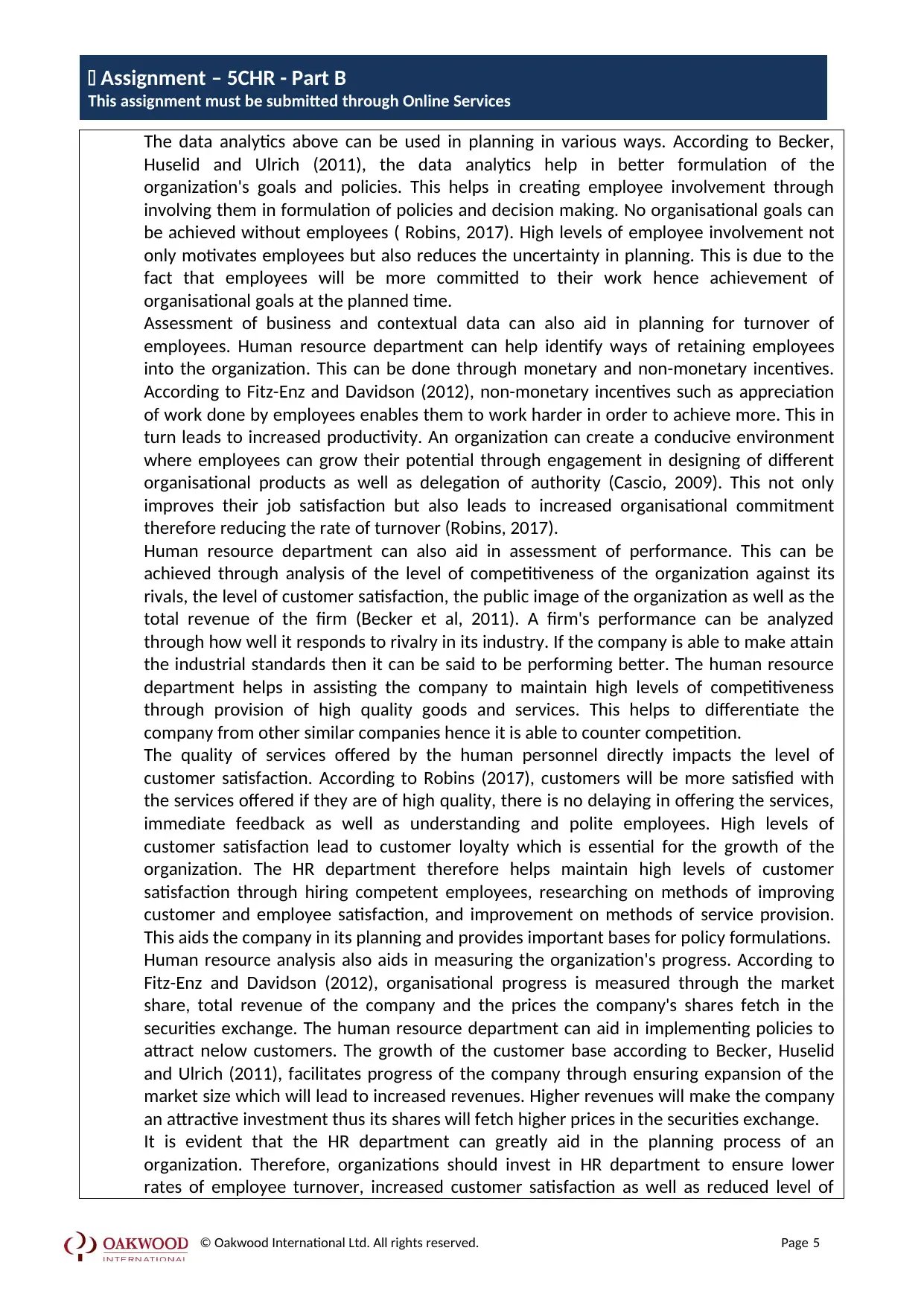
Assignment – 5CHR - Part B
This assignment must be submitted through Online Services
The data analytics above can be used in planning in various ways. According to Becker,
Huselid and Ulrich (2011), the data analytics help in better formulation of the
organization's goals and policies. This helps in creating employee involvement through
involving them in formulation of policies and decision making. No organisational goals can
be achieved without employees ( Robins, 2017). High levels of employee involvement not
only motivates employees but also reduces the uncertainty in planning. This is due to the
fact that employees will be more committed to their work hence achievement of
organisational goals at the planned time.
Assessment of business and contextual data can also aid in planning for turnover of
employees. Human resource department can help identify ways of retaining employees
into the organization. This can be done through monetary and non-monetary incentives.
According to Fitz-Enz and Davidson (2012), non-monetary incentives such as appreciation
of work done by employees enables them to work harder in order to achieve more. This in
turn leads to increased productivity. An organization can create a conducive environment
where employees can grow their potential through engagement in designing of different
organisational products as well as delegation of authority (Cascio, 2009). This not only
improves their job satisfaction but also leads to increased organisational commitment
therefore reducing the rate of turnover (Robins, 2017).
Human resource department can also aid in assessment of performance. This can be
achieved through analysis of the level of competitiveness of the organization against its
rivals, the level of customer satisfaction, the public image of the organization as well as the
total revenue of the firm (Becker et al, 2011). A firm's performance can be analyzed
through how well it responds to rivalry in its industry. If the company is able to make attain
the industrial standards then it can be said to be performing better. The human resource
department helps in assisting the company to maintain high levels of competitiveness
through provision of high quality goods and services. This helps to differentiate the
company from other similar companies hence it is able to counter competition.
The quality of services offered by the human personnel directly impacts the level of
customer satisfaction. According to Robins (2017), customers will be more satisfied with
the services offered if they are of high quality, there is no delaying in offering the services,
immediate feedback as well as understanding and polite employees. High levels of
customer satisfaction lead to customer loyalty which is essential for the growth of the
organization. The HR department therefore helps maintain high levels of customer
satisfaction through hiring competent employees, researching on methods of improving
customer and employee satisfaction, and improvement on methods of service provision.
This aids the company in its planning and provides important bases for policy formulations.
Human resource analysis also aids in measuring the organization's progress. According to
Fitz-Enz and Davidson (2012), organisational progress is measured through the market
share, total revenue of the company and the prices the company's shares fetch in the
securities exchange. The human resource department can aid in implementing policies to
attract nelow customers. The growth of the customer base according to Becker, Huselid
and Ulrich (2011), facilitates progress of the company through ensuring expansion of the
market size which will lead to increased revenues. Higher revenues will make the company
an attractive investment thus its shares will fetch higher prices in the securities exchange.
It is evident that the HR department can greatly aid in the planning process of an
organization. Therefore, organizations should invest in HR department to ensure lower
rates of employee turnover, increased customer satisfaction as well as reduced level of
© Oakwood International Ltd. All rights reserved. Page 5
This assignment must be submitted through Online Services
The data analytics above can be used in planning in various ways. According to Becker,
Huselid and Ulrich (2011), the data analytics help in better formulation of the
organization's goals and policies. This helps in creating employee involvement through
involving them in formulation of policies and decision making. No organisational goals can
be achieved without employees ( Robins, 2017). High levels of employee involvement not
only motivates employees but also reduces the uncertainty in planning. This is due to the
fact that employees will be more committed to their work hence achievement of
organisational goals at the planned time.
Assessment of business and contextual data can also aid in planning for turnover of
employees. Human resource department can help identify ways of retaining employees
into the organization. This can be done through monetary and non-monetary incentives.
According to Fitz-Enz and Davidson (2012), non-monetary incentives such as appreciation
of work done by employees enables them to work harder in order to achieve more. This in
turn leads to increased productivity. An organization can create a conducive environment
where employees can grow their potential through engagement in designing of different
organisational products as well as delegation of authority (Cascio, 2009). This not only
improves their job satisfaction but also leads to increased organisational commitment
therefore reducing the rate of turnover (Robins, 2017).
Human resource department can also aid in assessment of performance. This can be
achieved through analysis of the level of competitiveness of the organization against its
rivals, the level of customer satisfaction, the public image of the organization as well as the
total revenue of the firm (Becker et al, 2011). A firm's performance can be analyzed
through how well it responds to rivalry in its industry. If the company is able to make attain
the industrial standards then it can be said to be performing better. The human resource
department helps in assisting the company to maintain high levels of competitiveness
through provision of high quality goods and services. This helps to differentiate the
company from other similar companies hence it is able to counter competition.
The quality of services offered by the human personnel directly impacts the level of
customer satisfaction. According to Robins (2017), customers will be more satisfied with
the services offered if they are of high quality, there is no delaying in offering the services,
immediate feedback as well as understanding and polite employees. High levels of
customer satisfaction lead to customer loyalty which is essential for the growth of the
organization. The HR department therefore helps maintain high levels of customer
satisfaction through hiring competent employees, researching on methods of improving
customer and employee satisfaction, and improvement on methods of service provision.
This aids the company in its planning and provides important bases for policy formulations.
Human resource analysis also aids in measuring the organization's progress. According to
Fitz-Enz and Davidson (2012), organisational progress is measured through the market
share, total revenue of the company and the prices the company's shares fetch in the
securities exchange. The human resource department can aid in implementing policies to
attract nelow customers. The growth of the customer base according to Becker, Huselid
and Ulrich (2011), facilitates progress of the company through ensuring expansion of the
market size which will lead to increased revenues. Higher revenues will make the company
an attractive investment thus its shares will fetch higher prices in the securities exchange.
It is evident that the HR department can greatly aid in the planning process of an
organization. Therefore, organizations should invest in HR department to ensure lower
rates of employee turnover, increased customer satisfaction as well as reduced level of
© Oakwood International Ltd. All rights reserved. Page 5
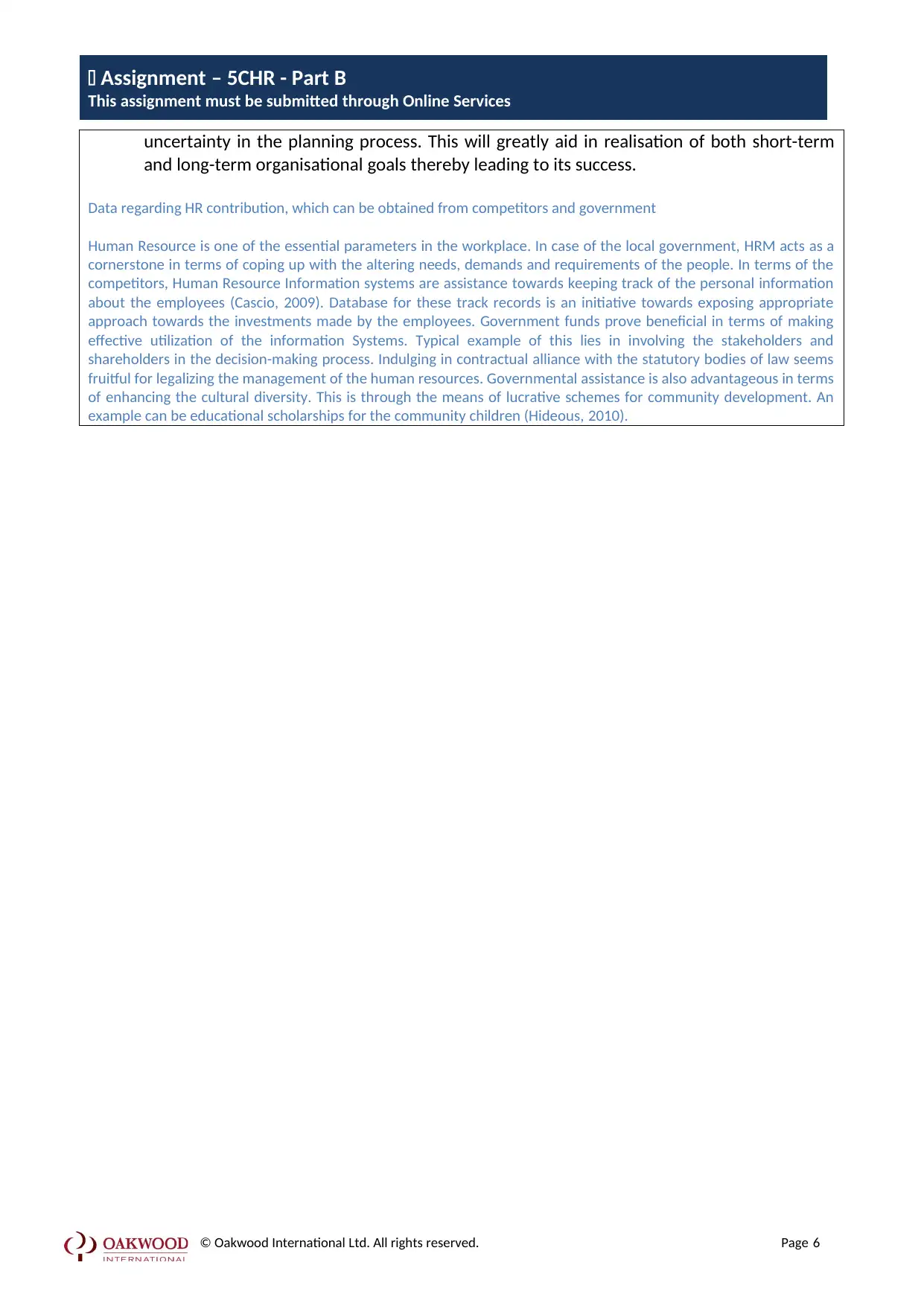
Assignment – 5CHR - Part B
This assignment must be submitted through Online Services
uncertainty in the planning process. This will greatly aid in realisation of both short-term
and long-term organisational goals thereby leading to its success.
Data regarding HR contribution, which can be obtained from competitors and government
Human Resource is one of the essential parameters in the workplace. In case of the local government, HRM acts as a
cornerstone in terms of coping up with the altering needs, demands and requirements of the people. In terms of the
competitors, Human Resource Information systems are assistance towards keeping track of the personal information
about the employees (Cascio, 2009). Database for these track records is an initiative towards exposing appropriate
approach towards the investments made by the employees. Government funds prove beneficial in terms of making
effective utilization of the information Systems. Typical example of this lies in involving the stakeholders and
shareholders in the decision-making process. Indulging in contractual alliance with the statutory bodies of law seems
fruitful for legalizing the management of the human resources. Governmental assistance is also advantageous in terms
of enhancing the cultural diversity. This is through the means of lucrative schemes for community development. An
example can be educational scholarships for the community children (Hideous, 2010).
© Oakwood International Ltd. All rights reserved. Page 6
This assignment must be submitted through Online Services
uncertainty in the planning process. This will greatly aid in realisation of both short-term
and long-term organisational goals thereby leading to its success.
Data regarding HR contribution, which can be obtained from competitors and government
Human Resource is one of the essential parameters in the workplace. In case of the local government, HRM acts as a
cornerstone in terms of coping up with the altering needs, demands and requirements of the people. In terms of the
competitors, Human Resource Information systems are assistance towards keeping track of the personal information
about the employees (Cascio, 2009). Database for these track records is an initiative towards exposing appropriate
approach towards the investments made by the employees. Government funds prove beneficial in terms of making
effective utilization of the information Systems. Typical example of this lies in involving the stakeholders and
shareholders in the decision-making process. Indulging in contractual alliance with the statutory bodies of law seems
fruitful for legalizing the management of the human resources. Governmental assistance is also advantageous in terms
of enhancing the cultural diversity. This is through the means of lucrative schemes for community development. An
example can be educational scholarships for the community children (Hideous, 2010).
© Oakwood International Ltd. All rights reserved. Page 6
⊘ This is a preview!⊘
Do you want full access?
Subscribe today to unlock all pages.

Trusted by 1+ million students worldwide
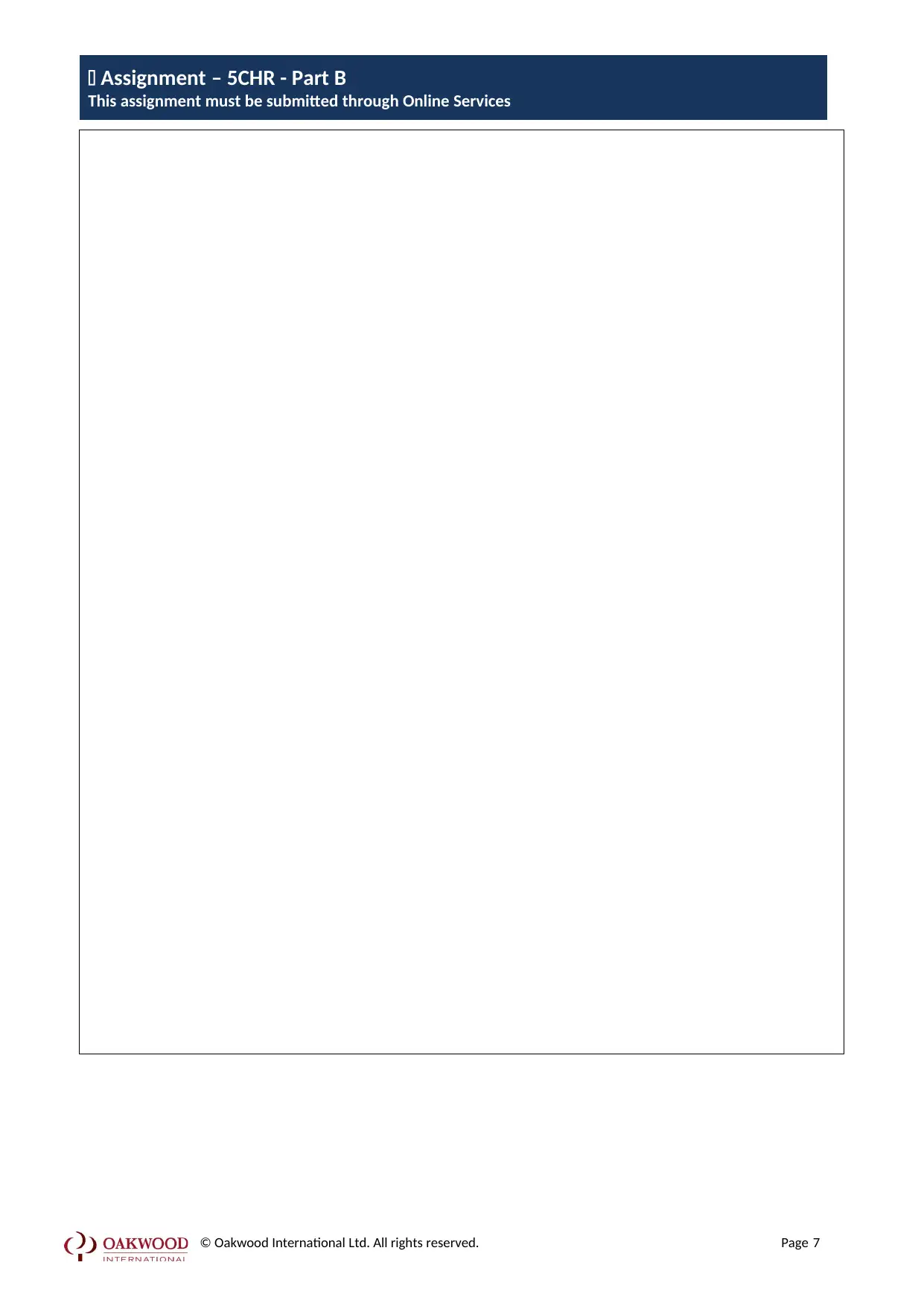
Assignment – 5CHR - Part B
This assignment must be submitted through Online Services
© Oakwood International Ltd. All rights reserved. Page 7
This assignment must be submitted through Online Services
© Oakwood International Ltd. All rights reserved. Page 7
Paraphrase This Document
Need a fresh take? Get an instant paraphrase of this document with our AI Paraphraser
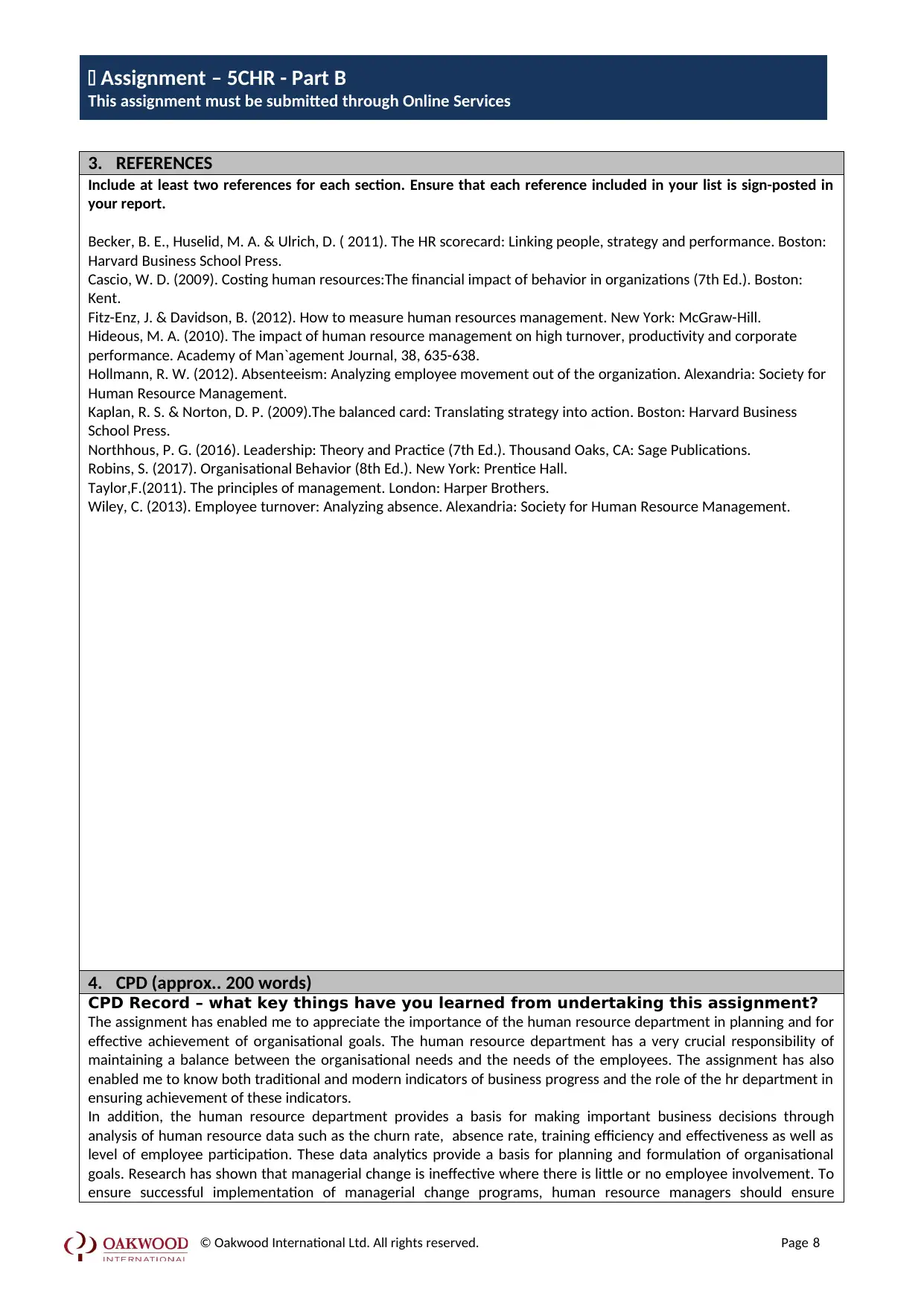
Assignment – 5CHR - Part B
This assignment must be submitted through Online Services
3. REFERENCES
Include at least two references for each section. Ensure that each reference included in your list is sign-posted in
your report.
Becker, B. E., Huselid, M. A. & Ulrich, D. ( 2011). The HR scorecard: Linking people, strategy and performance. Boston:
Harvard Business School Press.
Cascio, W. D. (2009). Costing human resources:The financial impact of behavior in organizations (7th Ed.). Boston:
Kent.
Fitz-Enz, J. & Davidson, B. (2012). How to measure human resources management. New York: McGraw-Hill.
Hideous, M. A. (2010). The impact of human resource management on high turnover, productivity and corporate
performance. Academy of Man`agement Journal, 38, 635-638.
Hollmann, R. W. (2012). Absenteeism: Analyzing employee movement out of the organization. Alexandria: Society for
Human Resource Management.
Kaplan, R. S. & Norton, D. P. (2009).The balanced card: Translating strategy into action. Boston: Harvard Business
School Press.
Northhous, P. G. (2016). Leadership: Theory and Practice (7th Ed.). Thousand Oaks, CA: Sage Publications.
Robins, S. (2017). Organisational Behavior (8th Ed.). New York: Prentice Hall.
Taylor,F.(2011). The principles of management. London: Harper Brothers.
Wiley, C. (2013). Employee turnover: Analyzing absence. Alexandria: Society for Human Resource Management.
4. CPD (approx.. 200 words)
CPD Record – what key things have you learned from undertaking this assignment?
The assignment has enabled me to appreciate the importance of the human resource department in planning and for
effective achievement of organisational goals. The human resource department has a very crucial responsibility of
maintaining a balance between the organisational needs and the needs of the employees. The assignment has also
enabled me to know both traditional and modern indicators of business progress and the role of the hr department in
ensuring achievement of these indicators.
In addition, the human resource department provides a basis for making important business decisions through
analysis of human resource data such as the churn rate, absence rate, training efficiency and effectiveness as well as
level of employee participation. These data analytics provide a basis for planning and formulation of organisational
goals. Research has shown that managerial change is ineffective where there is little or no employee involvement. To
ensure successful implementation of managerial change programs, human resource managers should ensure
© Oakwood International Ltd. All rights reserved. Page 8
This assignment must be submitted through Online Services
3. REFERENCES
Include at least two references for each section. Ensure that each reference included in your list is sign-posted in
your report.
Becker, B. E., Huselid, M. A. & Ulrich, D. ( 2011). The HR scorecard: Linking people, strategy and performance. Boston:
Harvard Business School Press.
Cascio, W. D. (2009). Costing human resources:The financial impact of behavior in organizations (7th Ed.). Boston:
Kent.
Fitz-Enz, J. & Davidson, B. (2012). How to measure human resources management. New York: McGraw-Hill.
Hideous, M. A. (2010). The impact of human resource management on high turnover, productivity and corporate
performance. Academy of Man`agement Journal, 38, 635-638.
Hollmann, R. W. (2012). Absenteeism: Analyzing employee movement out of the organization. Alexandria: Society for
Human Resource Management.
Kaplan, R. S. & Norton, D. P. (2009).The balanced card: Translating strategy into action. Boston: Harvard Business
School Press.
Northhous, P. G. (2016). Leadership: Theory and Practice (7th Ed.). Thousand Oaks, CA: Sage Publications.
Robins, S. (2017). Organisational Behavior (8th Ed.). New York: Prentice Hall.
Taylor,F.(2011). The principles of management. London: Harper Brothers.
Wiley, C. (2013). Employee turnover: Analyzing absence. Alexandria: Society for Human Resource Management.
4. CPD (approx.. 200 words)
CPD Record – what key things have you learned from undertaking this assignment?
The assignment has enabled me to appreciate the importance of the human resource department in planning and for
effective achievement of organisational goals. The human resource department has a very crucial responsibility of
maintaining a balance between the organisational needs and the needs of the employees. The assignment has also
enabled me to know both traditional and modern indicators of business progress and the role of the hr department in
ensuring achievement of these indicators.
In addition, the human resource department provides a basis for making important business decisions through
analysis of human resource data such as the churn rate, absence rate, training efficiency and effectiveness as well as
level of employee participation. These data analytics provide a basis for planning and formulation of organisational
goals. Research has shown that managerial change is ineffective where there is little or no employee involvement. To
ensure successful implementation of managerial change programs, human resource managers should ensure
© Oakwood International Ltd. All rights reserved. Page 8
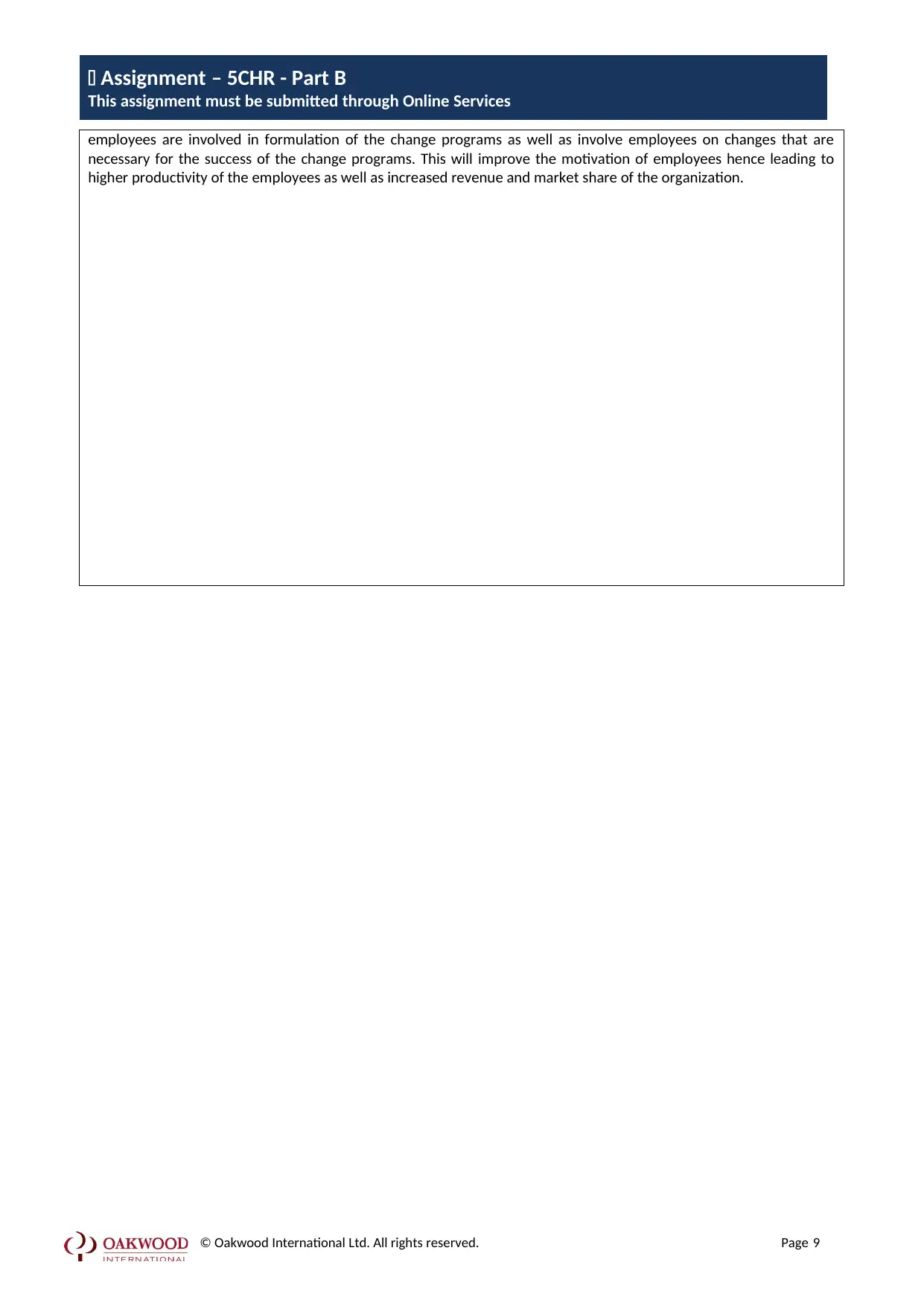
Assignment – 5CHR - Part B
This assignment must be submitted through Online Services
employees are involved in formulation of the change programs as well as involve employees on changes that are
necessary for the success of the change programs. This will improve the motivation of employees hence leading to
higher productivity of the employees as well as increased revenue and market share of the organization.
© Oakwood International Ltd. All rights reserved. Page 9
This assignment must be submitted through Online Services
employees are involved in formulation of the change programs as well as involve employees on changes that are
necessary for the success of the change programs. This will improve the motivation of employees hence leading to
higher productivity of the employees as well as increased revenue and market share of the organization.
© Oakwood International Ltd. All rights reserved. Page 9
⊘ This is a preview!⊘
Do you want full access?
Subscribe today to unlock all pages.

Trusted by 1+ million students worldwide
1 out of 9
Related Documents
Your All-in-One AI-Powered Toolkit for Academic Success.
+13062052269
info@desklib.com
Available 24*7 on WhatsApp / Email
![[object Object]](/_next/static/media/star-bottom.7253800d.svg)
Unlock your academic potential
Copyright © 2020–2026 A2Z Services. All Rights Reserved. Developed and managed by ZUCOL.





